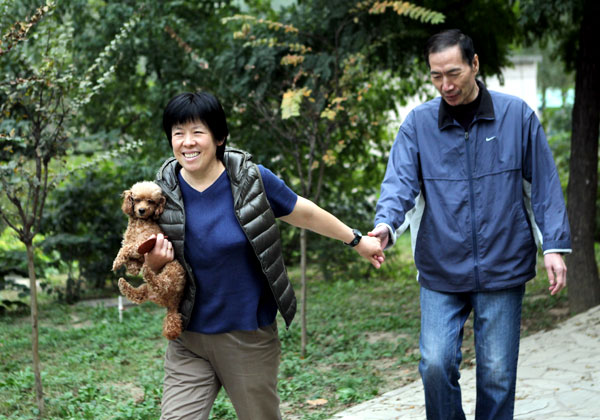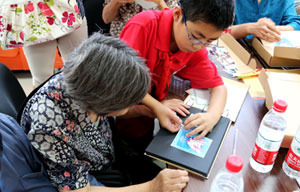At a loss
 |
|
Cao Guirong and her husband, who has suffered from dementia since 2005, enjoy the pleasure of a rare moment outdoors near their home in Beijing. [Photo by Zou Hong / China Daily] |
Families of dementia patients struggle to cope with the heartbreak as their loved ones slowly disconnect with reality. Institutions as well as caregivers are overwhelmed by the disability, Liu Zhihua reports.
For Beijing resident Cao Guirong, 56, life is like being in prison, hopeless.
Since 2005, when her 59-year-old husband began to suffer from dementia before a diagnosis of Alzheimer's disease, she has been watching him lose memory and the ability to take care of daily activities day after day, with no way to stop the progress.
"He has lost his intelligence, and needs care 24 hours a day," says Cao, who retired five years ago to take care of her husband.
Dementia, usually associated with old age and from conditions such as Alzheimer's, is a progressive brain disorder that makes it increasingly difficult to remember things, think clearly and communicate with others. That combination makes it virtually impossible for them to live without a caregiver, and the progress is irreversible.
China is estimated to have 9.19 million people suffering from the disorder, more than any other country, according to a study published in June in the British medical journal The Lancet.
"Dementia is devastating to patients' lives, and poses bitter challenges to their families and caregivers," says Wang Huali, deputy director of Dementia Care and Research Center with Peking University Institute of Mental Health.
But for Chinese families, life is particularly hard, due to scarcity of treatment and nursing facilities.
China has only 61 geriatric hospitals and less than 300 rehabilitation centers for its approximately 200 million senior people, including 16 million who have completely lost the ability to function in daily life, according to Wu Yushao, vice-president of the China National Committee on Aging.
Even worse, few hospitals have expertise in dementia, and many rehabilitation centers and nursing houses refuse to take in such patients.
"The burden is all on family members," says Cao Guirong, the caregiver. "There is no quality of life for me."
Every day, she needs to cleanse and dress her husband, feed him, make him exercise, and barely leaves him alone, for fear that he will get hurt.
Because he can easily go missing or trouble others because of incontinence, she doesn't dare to take him outdoors except when it's necessary - to exercise on a playground downstairs, or to go to the hospital, for example.



















